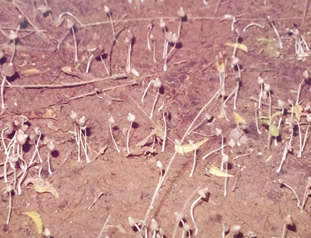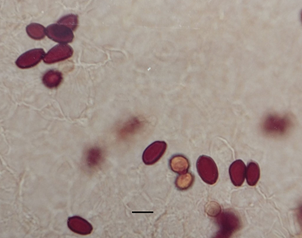Agaricus tiarella Berk. & Broome, Botanical Journal of the Linnean Society 11: 557 (1871)
MycoBank number: MB 506938; Index Fungorum number: IF 506938; Facesoffungi number: FoF 10772; Fig.7
Taxon synonyms
Psathyrella tiarella (Berk. & Broome) Sacc., Sylloge Fungorum 5: 1135 (1887)MycoBank number: MB 186308;
Pileus 0.5 – 1.5 cm in diameter, surface white, then grey at maturity, sometimes with brown tints at the apex which is pointed conical to campanulate, prominently umbonate with white umbo which is distinguishable from the rest of the pileus by its white colour on greyish- brown background , flesh thin, cap covered with minute, white, floccose, velar squamules and appendiculate margin . Stipe length 1.5 – 7.0 cm × 0.1– 0.2 cm in diameter, white, covered with white furfuraceous squamules, stipe flexous, cylindric, equal, fistulose. Veil persisting as floccose squamules on the pileus and stipe. Lamellae pale pink to dark- brown, adnexed, ascendant, grey then purplish fuscous,moderately crowded, edge white. Spores 10.0 – 15.0 × 5.5 – 8.5µm, elongate-ellipsoid, often with a suprahilar depression, thick-walled, smooth. Basidia 4-spored, clavate in shape. Lamellae edge sterile with crowded cheilocystidia which are utriform to lageniform, with a broadly rounded apex, hyaline, thin -walled. Pleurocystidia absent.
Ecology and distribution – Agaricus tiarella Scleroderma citrinum are a common gasteromycete fungus and widespread in North America, Central Europe, Asia, Africa, South America (Guzmán 1970, Sulzbacher et al. 2013) and Brazil (Gurgel et al. 2008, Montagner et al. 2015), Mexico (Guzmán et al. 2013) and Argentina (Nouhra et al. 2012). Presently, it has been reported from Mount Abu, Sirohi district of Rajasthan and was found growing alone, scattered, or gregarious, widespread after rainfall and is ectomycorrhizal with gymnosperm trees like Pinus roxburghii and Grewellia robusta.
Specimens Examined – JNV/Mycl/ 1030/2018, by Reenu Chouhan, 24°53’18.17″N72°50’52.58″E Sirohi, elevation:321 m (1,053 ft), Mount Abu 72.7083°E 24.5925°N Toad rock area.

a

b
Fig.7 (a.) Habit of Agaricus tiarella (b)Spores Scale bar =10 µm.
